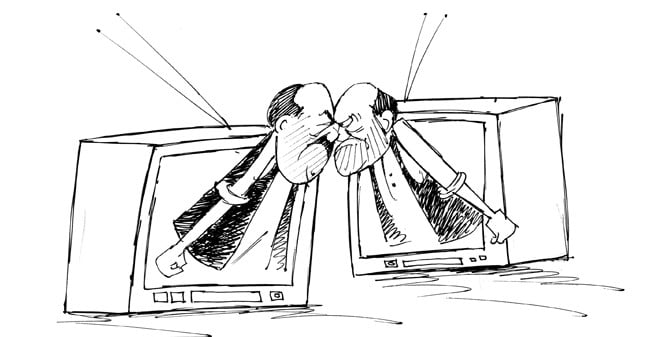

It will be a little unfair to expect the media to realign itself vis-à-vis other institutions and then discuss this realignment even if in the context of gaining or losing power. It is unfair not because the media hasn’t done it but because it has done it too many times in recent history.
In this constant interplay of institutional strengths and weaknesses, the media only needs to align itself to a more professional work ethic which, ideally speaking, means maintaining its impartiality, exercising editorial judgment in the interest of democratic values and searching for some mechanism for its own accountability.
However, given our peculiar conditions and perhaps because of the nature of the medium itself, it becomes an unwitting partner in most political situations that unfold.
Thus it may have been a neutral, rather professional, decision on the part of the media to show the footage of the then chief justice sitting in the army chief’s house receiving the orders of his ouster from the Chief in uniform in March 2007. That it infuriated the lawyers and triggered into protests across the country was clearly not the media’s intention. But the coverage of the manhandling of lawyers by the civil administration must have been a conscious editorial decision.
The momentum thus built crystallised into an effective movement that came to be known as the Lawyers’ Movement in due course. Eventually, General Musharraf had to first quit the office of the army chief and then resign as president of the country because of, as some suggest, the very electronic media he had helped create.
That the free media became a catalyst for political change in this country was an image too flattering for the media itself and one that it has not been able to disengage from since then. It was at that point the media put its weight behind one institution -- judiciary -- which was projected as the sole custodian of Rule of Law and, in fact, all democratic norms.
With the new political dispensation, inducted after the 2008 general elections, refusing to restore the judges including the chief justice of Pakistan ousted as a result of the Nov 3 emergency, the media or a powerful section of it took up cudgels against the elected government. There was unquestioning obedience of judiciary as it overstepped its powers and extensive coverage of the court proceedings with each and every remark of the judges, mostly against the elected government, becoming ‘breaking news’. After a while, it seemed as if the remarks (or soundbites) were intentionally made for television viewers.
The talk shows content proceeded along similar lines -- ‘a corrupt government’ on the rampage with a clean superior judiciary desperately trying to bring efficiency into the system. There was occasional sparring between the judges and some unseen military high-ups either in the Missing Persons case or an odd Asghar Khan case.
In 2011 came the infamous Memo Case when once again a powerful section of the media made a mockery of objectivity. Interestingly, this time it worked in collusion with the armed forces, judiciary and a section of the opposition led by none other than Mian Nawaz Sharif himself. An article ostensibly written as a critique of the ISI in the Financial Times was selectively twisted; the brunt was to be borne by the ‘corrupt’ and ‘incompetent’ government and its officials charged now with nothing less than ‘treason’.
The media wrote one-sided stories till the head of the ambassador Husain Haqqani was rolled. Army alone was the sole arbiter of national interest and national security was the message sent home with active cooperation by the media.
Today, the media sees itself not just as the fourth pillar but as the most important pillar of state without which the whole edifice would crumble. Yet, it is one institution that operates without any semblance of accountability, not even a vague Code of Ethics.
The Musharraf trial which became possible because of his unceremonious ouster is a reminder of media’s own days of glory. It can bask in that glory only up to a certain time -- when the statement from the ISPR comes. Once the statement comes, each institution including the media aligns and realigns according to it.
But even the ISPR relies on the media to spread its message. Besides, it is on the media that the dignity of army is/was tattered to pieces.
In the ultimate analysis, the media content has become strong over the years but at the same time the mediapersons have become vulnerable both at the hands of state and anti-state elements. But, as said earlier, the media can make its mark only if it becomes more professional and impartial, and less sensational and agenda-driven.